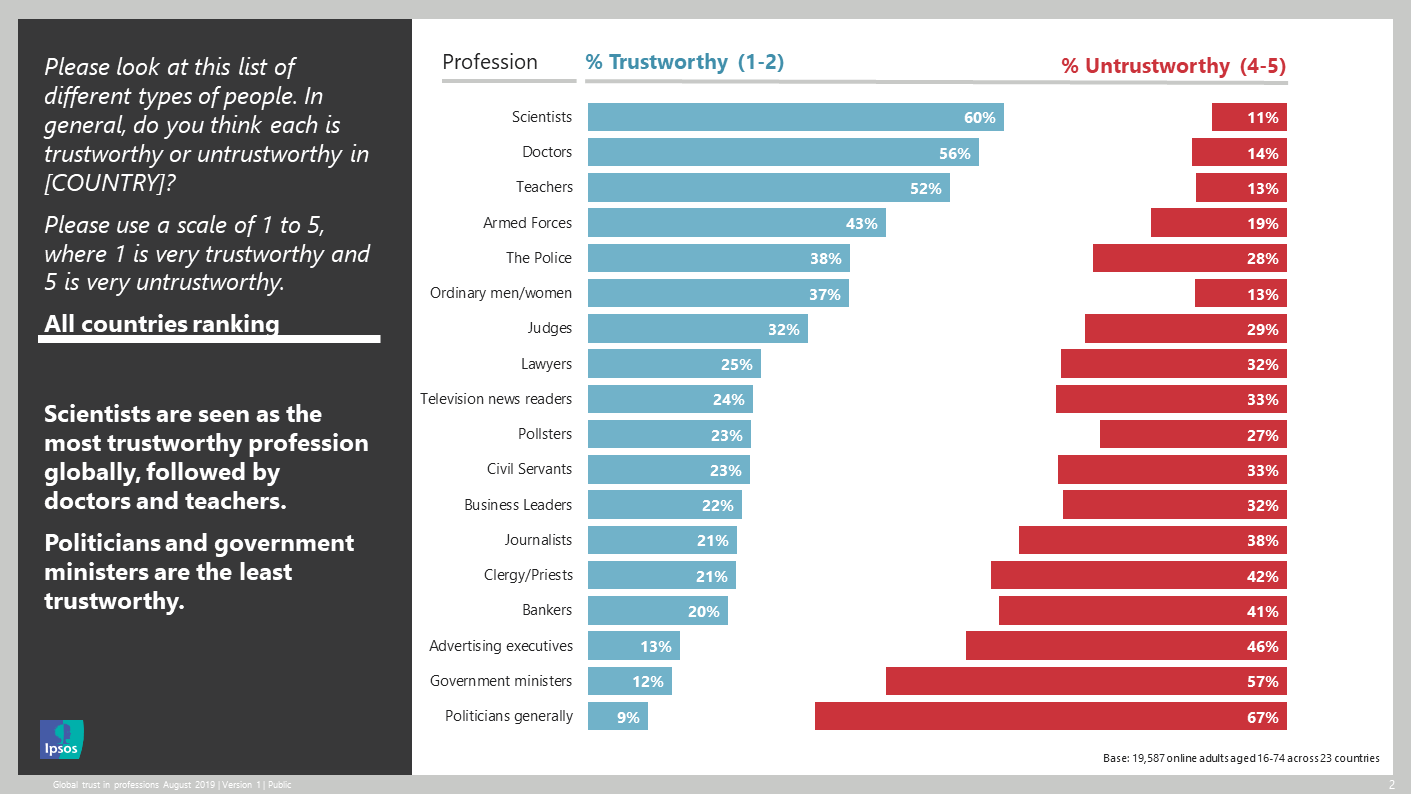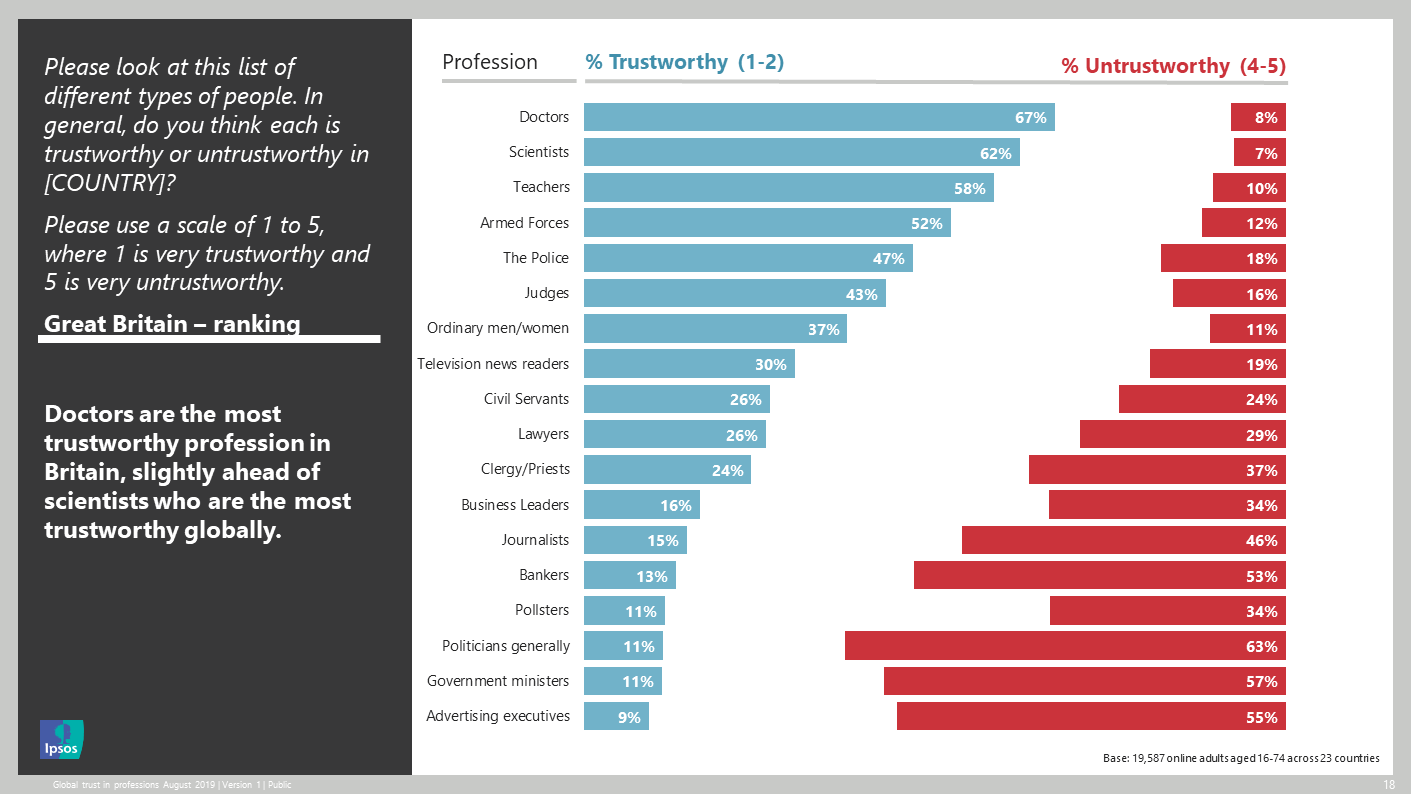It’s a fact! Scientists are the most trusted people in world
A new Ipsos poll for out latest report Trust: the Truth reveals that scientists are considered the most trustworthy profession in the world, followed closely by doctors. Six in ten of the global public rate scientists as trustworthy and just one in ten consider them untrustworthy. The next most-trustworthy profession is doctors (56% trustworthy), followed by teachers (52%). Politicians are the least trusted group globally.
The survey, completed online by adults aged 16-64 in 22 countries, showed that while the most trustworthy profession varies across the countries covered, there is greater agreement on the professions considered to be untrustworthy. In all countries polled, politicians are seen as the most untrustworthy profession – globally, two thirds of the public consider politicians generally to be untrustworthy (67%) and almost six in ten say the same about Government Ministers (57%).

The index also shows that:
- Scientists are the most trustworthy profession in Argentina, Germany, Hungary, Italy, Japan, South Korea, Saudi Arabia, Mexico, Poland, Russia, Sweden and Turkey
- Doctors are the most trustworthy for citizens of Australia, Belgium, Canada, France, South Africa, Spain and Sweden (where they are tied with scientists)
- Teachers are the most trustworthy profession for Brazilians and Americans.
- Indians see armed forces members as the most trustworthy profession, while in China it is the police.
- Members of the armed forces are the fourth most trustworthy profession overall, seen as trustworthy by 43 per cent. Perceptions of the trustworthiness of servicemen and women are highest in China (72%), India (70%) and the US (60%), while they are particularly low in Germany (24%) and South Korea (18%).
- Trust in the police – overall the fifth-most trusted profession on 38 per cent – ranges widely from 80 per cent in China to 11 per cent in Mexico. In addition to China, a majority of the public consider the police to be trustworthy in Australia (56%), France (53%), Canada (52%) and Italy (50%).
Trust in Britain
- Doctors are the most trusted profession in Great Britain with over two-thirds finding them trustworthy.
- Advertising executives are the most lacking in trust with only 9% seeing them as trustworthy.
- Politicians generally and government ministers are the most untrustworthy with 63% and 57% citing them as such respectively.
- Globally, Britons are among the most trusting of judges with 43%.

The Global Trustworthiness Index
Comparing net trust scores across nations shows which countries are marked by low trust in professions, and which show higher levels of trust.
In all, nine of 22 countries in the index have positive scores. This means that most of the professions listed have net positive scores – more people consider them to be trustworthy rather than untrustworthy. The remaining thirteen countries have negative scores, which indicates higher levels of distrust with most professions. The overall figure for all 22 countries also negative.
- China scores highest on the Index, followed by India, with Canada in third.
- Sweden, the US, France, Australia, and Germany also show positive scores, meaning citizens of these countries are more trusting of most professions covered in the poll
- Argentina, South Korea and Hungary are the bottom three countries on the index, indicating high levels of distrust with professions. These three countries are notably more negative than the rest of the countries in the poll, which also have negative scores overall.
Read the Report Trust: The Truth online
Ben Page, CEO of Ipsos, says:
It has been said that we no longer trust experts. This study shows that in fact, scientists are held in high esteem all over the world. Many professions have high levels of trust. As our new report, Trust: the truth shows, trust is not in a new acute crisis.
Technical Note:
- The data is taken from a forthcoming Ipsos Thinks publication, “Trust: The Truth”, which explores the theory and arguments surrounding the complicated concept of trust.
- Interviews were conducted using the Ipsos Online Panel system, among 19,587 online adults aged 16-74 in 23 countries (Argentina, Australia, Belgium, Canada, France, Germany, Great Britain, Hungary, Italy, Japan, Poland, South Korea, Spain, Sweden, the United States, Brazil, China, India, Mexico, Russia, Saudi Arabia, South Africa and Turkey).
- Fieldwork was conducted during October 2018. Data is weighted to match the profile of each population.
- Participants were asked “Please look at this list of different types of people. In general, do you think each is trustworthy or untrustworthy in your country? Please use a scale of 1 to 5, where 1 is very trustworthy and 5 is very untrustworthy.”
- The percentage of participants who consider a profession to be trustworthy is taken as all who answered “1” or “2” to the question. The proportion who consider a profession to be untrustworthy is from those who coded “4” or “5”.
- The trustworthiness index is calculated as the sum of the proportion who consider each profession to be trustworthy, subtracted from the sum of those who consider each to be untrustworthy. The index has not been calculated for Saudi Arabia, where not all answer options were available.
- In countries where internet penetration is approximately 60% or higher the data output generally reflects the overall population. Of the 26 countries surveyed online, 15 yield results that are balanced to reflect the general population: Argentina, Australia, Belgium, Canada, France, Germany, Great Britain, Hungary, Italy, Japan, Poland, South Korea, Spain, Sweden, and United States. The eight remaining countries surveyed – Brazil, China, India, Mexico, Russia, Saudi Arabia, South Africa and Turkey – have lower levels of internet connectivity and reflect online populations that tend to be more urban and have higher education/income status than the general population.
- The precision of Ipsos online polls are calculated using a credibility interval with a poll of 1,000 accurate to +/- 3.1 percentage points and of 500 accurate to +/- 4.5 percentage points. For more information on the Ipsos use of credibility intervals, please visit the Ipsos.com website.




